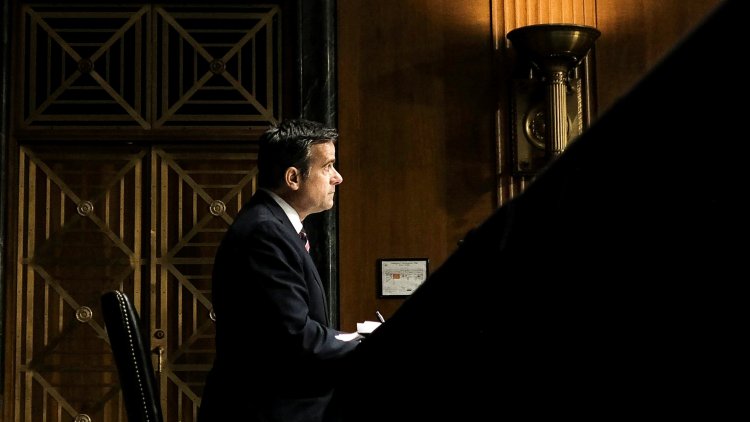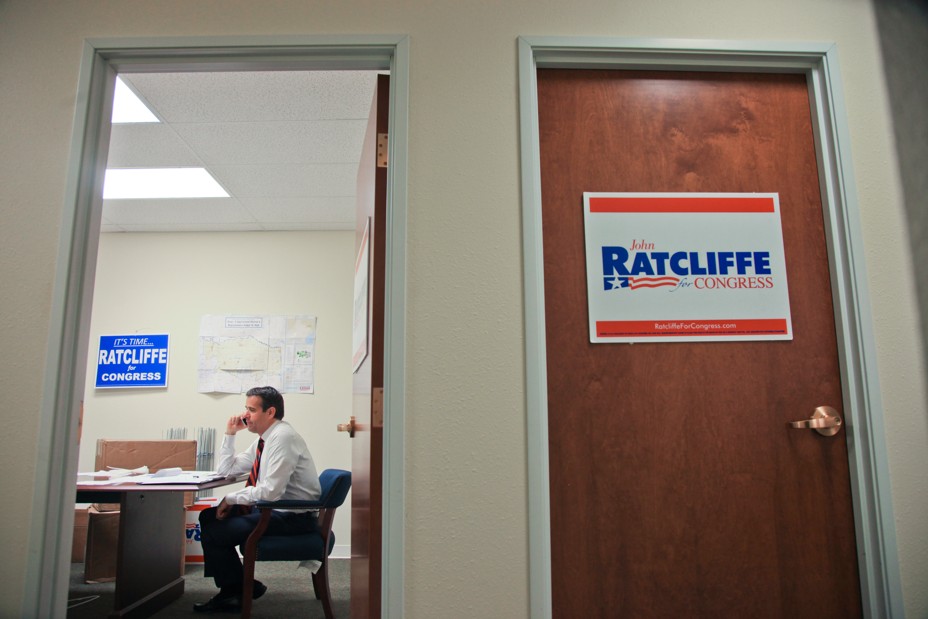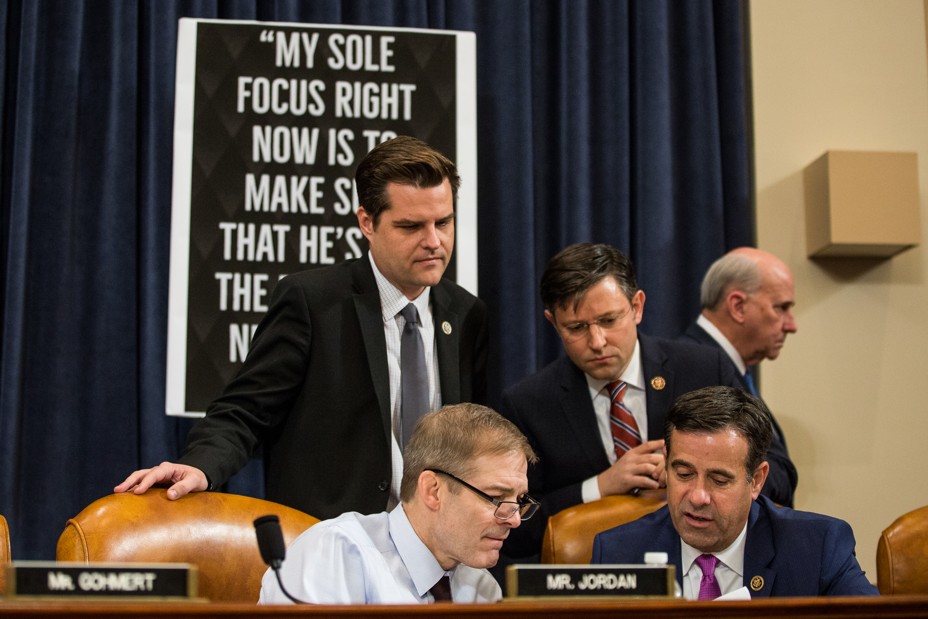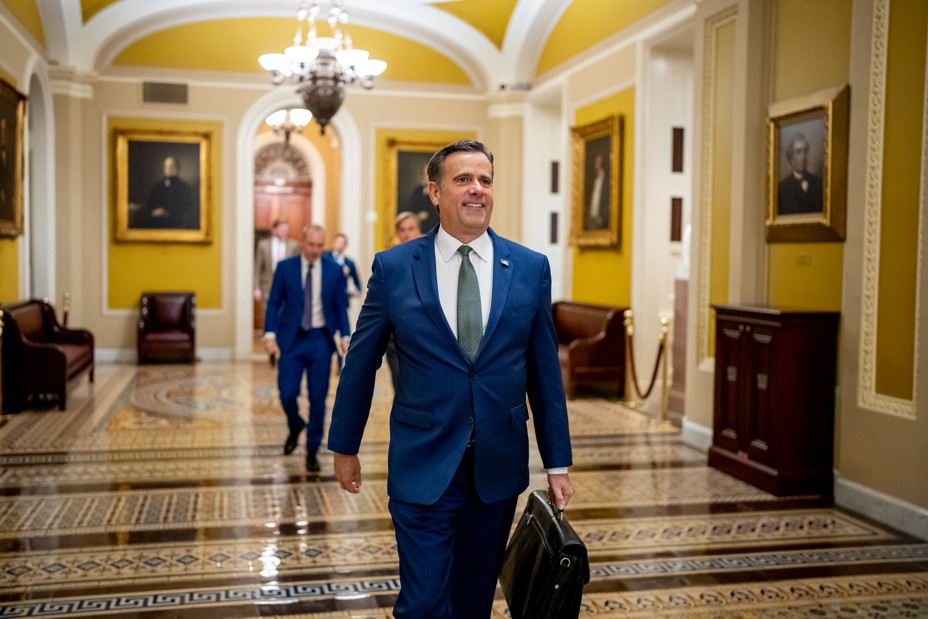The Rise of John Ratcliffe
A partisan loyalist with a history of politicizing intelligence will soon be running the CIA.

This article was featured in the One Story to Read Today newsletter. Sign up for it here.
In September 2016, the CIA sent a classified memo to the FBI, which was investigating Russian interference in the presidential election. According to Russian intelligence sources, Hillary Clinton had approved a plan to publicly tie Donald Trump to the country’s hack of the Democratic National Committee. The Russians reportedly said that Clinton wanted to distract the public from the scandal over her use of a private email server while she was secretary of state.
As secret tips from spies go, this one was not earth-shattering. FBI agents didn’t need the CIA to tell them that Clinton was painting Trump as an ally of the Kremlin—her campaign chair was on CNN saying just that. Trump was also making Clinton’s case for her: In late July, he had publicly encouraged the Russians to hack her email, which they then tried to do.
The CIA memo may have been obvious and not particularly useful. But it did contain “sensitive information that could be source revealing,” its authors cautioned, so the information was limited to those with a “need-to-know” status and “should not be released in any form.” Exposing human sources—spies—compromises intelligence gathering and can sometimes get them killed. For four years, the document’s stewards complied and kept it secret. Then it caught the attention of John Ratcliffe, President Trump’s director of national intelligence.
[Read: Clinton: Just trust me on this one]
Ratcliffe had been a divisive pick for the nation’s top intelligence adviser, made late in Trump’s term. His critics said he lacked sufficient national-security experience and was a partisan warrior. As a freshman Republican representative from Texas, he had risen to national prominence by suggesting a theory, during committee hearings and television appearances, that Clinton had engineered the FBI’s investigation into the Trump campaign’s possible connections to Russian interference. (Ratcliffe surely knew that she had not, because this had been exhaustively established by multiple investigations, including one led by Senate Republicans.)
In late September 2020, weeks before voters would choose between Trump and Joe Biden, Ratcliffe declassified and released the CIA memo, along with some notes from an intelligence briefing given to President Barack Obama. He claimed that he was responding to requests from Congress to shed light on the FBI’s Russia investigation, but the documents didn’t provide much new information.
Intelligence officials were appalled. History had repeatedly, painfully, shown that politics and intelligence were a dangerous mix, and as the DNI, Ratcliffe was expected to avoid partisan behavior and safeguard sources and methods. Also, officials warned, the Russians might have wanted that memo to be released; even four years on, anything mentioning Clinton, Russia, and Trump was politically combustible and potentially disruptive to the election. Gina Haspel, then the director of the CIA (a Trump appointment), opposed the document’s release. So did officials at the National Security Agency.
But to Trump and some of his advisers, the memo had a certain expedience. The president seized on it as new evidence of Clinton’s hidden hand in the “Russia hoax,” a subject that reliably caused him to rage against his supposed enemies inside the intelligence agencies.
“It is imperative that the American people now learn what then–Vice President Joe Biden knew about this conspiracy and when he knew it,” the Trump campaign’s communications director said in a statement at the time. “Biden must give a full accounting of his knowledge and his conversations about Clinton’s scheme, which was known to the highest reaches of his administration.”
Trump himself made passing reference to the intelligence in his first debate with Biden, accusing Clinton of “a whole big con job” and the intelligence community of “spying on my campaign.”
Ratcliffe had cherry-picked just the thing to feed Trump’s fixation on “deep state” chicanery and malfeasance. The act was nakedly political. And it surprised no one.
Ratcliffe’s appeal to Trump has always been clear: He’s a political operator willing to push the boundaries of a historically apolitical position in a manner that serves the president’s interests. In November, Trump nominated Ratcliffe for an even more important job than the previous one: CIA director. The question likely to hang over his tenure is how much further he will go to enable Trump’s attacks on the intelligence community.
When Trump nominated Ratcliffe as the DNI in 2019, he gave him marching orders to “rein in” the forces that the president believed were undermining him. “As I think you’ve all learned, the intelligence agencies have run amok,” Trump told reporters. Ratcliffe would get them back in line. But lawmakers were wary of appointing such a staunch partisan, and amid concerns about his experience, Democrats and key Republicans questioned whether he had exaggerated his credentials, something Ratcliffe denied. After only five days, Ratcliffe (who declined to be interviewed for this article) withdrew his candidacy. Trump nominated him again in 2020, and he was narrowly confirmed along party lines, 49–44. He received more votes in opposition than any DNI in the office’s 15-year history.
[Read: Ratcliffe’s withdrawal reveals Trump still doesn’t understand appointments]
When Trump named Ratcliffe as his pick for CIA director, he again made his expectations clear: He praised Ratcliffe for exposing alleged abuses by the FBI and former intelligence officials, and for showing “fake Russian collusion to be a Clinton campaign operation.” But this time, the response in Washington has been muted.
Having served as the DNI for eight months, Ratcliffe is now better qualified to run an intelligence agency. He also benefits from comparison with Trump’s other choices for top national-security positions: at the Pentagon, Pete Hegseth, who has been accused of sexual assault and alcohol abuse (he has denied the allegations); at the FBI, Kash Patel, a fervent Trump supporter who has threatened to investigate the president’s critics, including journalists; and for the DNI, Tulsi Gabbard, a former representative who has expressed sympathy for some of the world’s most notorious anti-American dictators, including Vladimir Putin and Bashar al-Assad.
Compared with these selections, Ratcliffe looks like an elder statesman, and he has essentially been anointed: The Senate will almost certainly confirm him, which will make Ratcliffe the only person ever to have served as both the DNI and the director of the CIA. Several U.S. and allied intelligence officials told me that they would welcome this development, given the alternatives. Patel had been on Trump’s shortlist to run the CIA, some reminded me.
[Read: Trump’s ‘deep state’ revenge]
But the question of where Ratcliffe’s limits lie is even more salient in Trump’s second term. Though the DNI technically ranks higher than the director of the CIA, the latter is the more powerful post. The DNI is largely a managerial job; the CIA director is operational. From Langley, Ratcliffe would control covert intelligence activity. He could learn the locations and identities of spies. The CIA is also the primary interlocutor for foreign intelligence services, which share information that could implicate their sources if exposed. Several foreign intelligence officials have recently told me that they are taking steps to limit how much sensitive intelligence they share with the Trump administration, for fear that it might be leaked or used for political ends.
Some U.S. officials fear that Trump could direct the CIA to undertake illegal activities, such as aiding paramilitary forces inside the United States to secure the border, or clandestinely spying on Americans, knowing that the president would enjoy criminal immunity for official acts thanks to a recent Supreme Court opinion. These are extreme examples, and Trump would surely face internal resistance. But Ratcliffe has demonstrated that he’s willing to break norms and traditions. How would he respond if the president asked—or ordered—him to do something more drastic than declassify documents?
Though Trump has turned to Ratcliffe twice to “rein in” the deep state, his political origin story is actually rooted in the security state’s expansion. After graduating from Notre Dame in 1986, when he was only 20, Ratcliffe went to law school and then into private practice in Texas. “But something was missing,” he told senators at his DNI confirmation hearing. On September 11, 2001, Ratcliffe said, he was at work in a high-rise office building in Dallas that “looked a whole lot like the ones in New York that were under attack”—and he wondered, in the months that followed, how he might devote his time to more meaningful work.
Ratcliffe had gotten to know Matt Orwig, the U.S. attorney for the Eastern District of Texas and a George W. Bush appointee. Orwig needed someone to run a joint terrorism task force, one of the dozens set up after the attacks to coordinate federal and regional security efforts. The goal was not only to prosecute terrorism crimes but to prevent them from happening. Ratcliffe took the job in 2004.
“The whole law-enforcement structure was being remade,” Orwig told me. “There was a lot of information flooding in from different authorities. It was a really big job.” In 2007, Orwig stepped down, and Ratcliffe became U.S. attorney for 11 months. Afterward, he returned to private practice, running the Dallas office of a firm he co-founded with John Ashcroft, Bush’s first attorney general.
Ashcroft became Ratcliffe’s political mentor, an association that seems ironic in retrospect. Ashcroft was in many ways an architect of the powerful national-security bureaucracy that Trump and Ratcliffe now rail against. After 9/11, the attorney general oversaw and approved controversial applications of the PATRIOT Act and other new authorities, including secret wiretapping of phone calls involving Americans. Such counterterrorism measures enhanced the powers of the Justice Department and the intelligence community, and occasionally encroached on civil liberties that Americans had long taken for granted.
Ratcliffe and Ashcroft shared a deeply conservative political outlook, and Ashcroft admired the younger attorney’s commitment to community service. Ratcliffe was also serving as the mayor of Heath, Texas, a bedroom community where he lived with his wife and two children. Ashcroft thought Ratcliffe was suited for national leadership. “We decided he should run for Congress,” Ashcroft told me, and in 2014, Ratcliffe did.
[Read: The case of John Ashcroft]
Getting to Washington would test Ratcliffe’s budding political skills. Ralph Hall, a conservative Democrat who switched to the GOP in 2004, had reliably represented the fourth congressional district, where Ratcliffe lived, since 1981. At 91, Hall was the oldest-ever member of the House of Representatives, and his voters seemed in no mood to replace him with a young upstart. But the Tea Party was elevating a new generation of conservatives who were suspicious of entrenched power, and in a bid for change that avoided taking aim at Hall’s age, Ratcliffe promised to bring “energetic leadership” to the district. “It’ll be up to the voters to decide whether or not a candidate is too old,” Ratcliffe, who was 42 years younger than Hall, told reporters at the time.
Ratcliffe picked up endorsements from conservative groups, including the Club for Growth, and eventually defeated Hall in a runoff. He was the first primary challenger to beat a Republican incumbent in Texas in 20 years. His political acumen was now beyond dispute, according to Todd Gillman, a reporter for The Dallas Morning News. “Affable. Discreet. Knife fighter,” Gillman wrote in a recent column for The Washington Post. “All of it was there to see when Ratcliffe took down the oldest member of Congress ever without coming off like a jerk.”
In Washington, Ratcliffe discovered the full extent of his talents, which included a lawyerly facility for constructing political narratives that appealed to Republicans. He fell in with fellow conservatives who were also new to Congress. Trey Gowdy, another former federal prosecutor, introduced him to his fellow South Carolinian Tim Scott. The three spent many evenings together, eating dinner and talking about their lives and political ideas.
Gowdy helped Ratcliffe raise his national profile and get Trump’s attention. At a hearing in September 2016, the representative grilled James Comey, the FBI director, about the investigation of Hillary Clinton’s private email server, questioning whether officials had already decided that there was no prosecutable crime when they sat down to interview the presidential candidate. Ratcliffe was aggressive but not hectoring. His questions were clearly prepared, but his delivery seemed unrehearsed. He corrected Comey’s account of a chain of events in the FBI’s investigation, prompting the director to admit that he might have been misremembering. It wasn’t exactly a gotcha moment, but Ratcliffe showed that he could confuse an adversary with a blizzard of facts.
After Ratcliffe finished with Comey, Gowdy passed him a handwritten note: “100 percent A+.”
“That was really a moment for me where I thought, You know, I’m really where I’m supposed to be,” Ratcliffe recalled in 2021 on a podcast that Gowdy hosts.
Ratcliffe credited Gowdy with steering his career. “You said to me, ‘Johnny, focus on what you do well, get better at it, and shut up about the rest.’ And I literally followed that advice. In other words, only go on TV to talk about things that you know about. Don’t try and be a master of all trades. Do the things that you do really well and people will notice, and it will serve you well. And it did.”
Gowdy helped make Ratcliffe a go-to interrogator when congressional committees wanted to quiz the FBI or poke holes in the Russia investigation. Ratcliffe stuck to a theme of pernicious bias against Trump. He suggested that political animus, not genuine concern about foreign-intelligence threats, was the impetus behind the Russia probe. He also suggested that the CIA—the agency he is about to lead—may have kicked off the investigation. (It did not, and this is among the fringiest views that Ratcliffe has flirted with.)
[Read: Don’t let the Russia probe become the new Benghazi]
Ratcliffe’s performances impressed Trump. But although he, Gowdy, and Scott are deeply conservative, they are not MAGA Republicans. They seem to share Trump’s antipathy toward the federal bureaucracy. But their political ideas were shaped by forces that gave rise to Trump, not by the man himself. Gowdy, who left Congress in 2019, got on Trump’s bad side for not embracing his conspiracy theories about Democrats spying on his campaign, and Scott competed against Trump in the GOP’s 2024 presidential primary.
As for Ratcliffe, he has more fiercely defended Trump as a victim of an unfair system than championed him as a hero sent to fix it. In one of the most-watched hearings of the Trump era, Ratcliffe lit into Special Counsel Robert Mueller and the language of his final report, which stated that although the investigation “does not conclude that the President committed a crime, it also does not exonerate him.” That was an unfair standard no American should face, Ratcliffe insisted. “Donald Trump is not above the law,” he thundered. “But he damn sure shouldn’t be below the law.”
It was a principled position, and perhaps a reflection of sincere disquiet about the politicization of law enforcement and the intelligence community. Ashcroft told me that he shares such concerns and speaks with Ratcliffe four or five times a year about reforming the system. But when Ratcliffe takes these stances, he also gives credence to Trump’s refrains about “Crooked Hillary” and the deep state. And he makes little effort to distinguish Trump’s critique from his own.
[Read: Republicans take their shot at Mueller—and narrowly miss]
Ratcliffe probably wouldn’t have become the director of national intelligence if not for another pro-Trump partisan, Richard Grenell. The then-ambassador to Germany was also serving as the acting intelligence director when Trump nominated Ratcliffe for the second time, in 2020. The president essentially forced the Senate to choose between the two. Grenell had long been loathed and even feared in some quarters of Congress for his heated rhetoric and vicious social-media attacks. Suddenly, Ratcliffe seemed like the less political option.
Ratcliffe took office less than six months before the 2020 election. The intelligence agencies he now led were on guard against foreign governments trying to skew political contests with misleading social-media posts and divisive propaganda. Russia, once again, was a top concern.
Nothing angered Trump like talk of Russia trying to help him win an election. His aides had learned to avoid the subject. The president had identified China as the biggest strategic threat to the United States, an assessment that many Democrats and Republicans shared, Ratcliffe among them. But career intelligence analysts doubted that China intended to disrupt the election. What Beijing really wanted was stability in its relationship with Washington, they argued. Trying to help one candidate win, as Russia had in 2016, could backfire.
[Read: Trump’s intelligence war is also an election story]
In August 2020, the intelligence community produced a classified assessment of election threats. Then Ratcliffe intervened, analysts have said, and inserted a warning about China that was an “outrageous misrepresentation of their analysis,” according to a later report by an intelligence ombudsman.
The DNI typically does not help write intelligence assessments, because he is a political appointee, and so his involvement could present a conflict of interest. But Ratcliffe argued that although his intervention was unusual, it was not unprecedented, nor was it inappropriate. He maintained that the analysts were thinking too narrowly: China’s well-documented efforts to lobby state and local officials, and to steal corporate intellectual property and classified government information, were aimed at achieving political outcomes. That made them, in effect, a kind of election interference. The ombudsman also found that the analysts working on China and the ones working on Russia used different definitions for influence and interference. Ratcliffe argued that such discrepancies could create the false impression that Russia was trying to affect the U.S. election but China was not.
“I know my conclusions are right, based on the intelligence that I see,” he said, according to the ombudsman. “Many analysts think I am going off the script. They don’t realize that I did it based on the intelligence.”
Ratcliffe’s defenders say that his role as the DNI obligated him to speak up, even if that meant straying into red-hot political topics. “What I saw was him reflecting a value of transparency and informing the public,” said one U.S. intelligence official who worked for Ratcliffe when he was the DNI and asked not to be identified by name. “Sometimes he would challenge assessments and assumptions, I think in the interest of seeing if they would hold. He is an attorney by trade. You kind of have to keep that in mind when you brief him.”
Ratcliffe wasn’t the only one to gauge the threat from China more broadly: Two senior intelligence officers also expressed views on China’s interference activities that were in line with Ratcliffe’s assessment. But Ratcliffe didn’t raise the same level of concern about Russia, which many analysts thought posed the more direct threat to the election. He framed the issue, not for the first time, in a way that lent support to Trump’s political argument. And because the DNI was making that case, the ostensibly objective work of intelligence now had a partisan gloss.
[Read: Trump calls out election meddling—by China]
When announcing Ratcliffe’s nomination for CIA director, Trump indicated what he valued most in his pick: From “exposing” the Russia investigation as the alleged handiwork of the Clinton campaign to “catching the FBI’s abuse of Civil Liberties at the FISA Court, John Ratcliffe has always been a warrior for Truth and Honesty with the American public,” Trump wrote in a social-media post. The reference to the Foreign Intelligence Surveillance Court was shorthand for one of Trump’s elastic theories about how Democrats had spied on his 2016 campaign.
He also lauded Ratcliffe for publicly refuting 51 former intelligence officers who had claimed in a letter that the 2020 discovery of emails on a laptop purporting to belong to Joe Biden’s son Hunter had “all the classic earmarks of a Russian information operation.” Ratcliffe was right about that one: No evidence linked Hunter Biden’s laptop to a Russian plot to harm his father. But the letter by the former officials was an act of free speech and an expression of opinion by former officials and experts—not something that the DNI traditionally makes his business.
In the four years he has been out of government, Ratcliffe has remained an enthusiastic critic of the intelligence community. He co-authored a September 2023 op-ed in The Wall Street Journal with a former aide, reflecting on “a dangerous trend inside the CIA to politicize intelligence on China, and to suppress dissenting views that stray from the company line.” He was particularly worried about resistance to investigating the origins of the coronavirus pandemic. The once-fringe view that the virus likely originated in a laboratory in China, which Ratcliffe believes, has gained more respectability thanks in part to U.S. intelligence.
[Read: The coronavirus conspiracy boom]
Tim Scott told me that Ratcliffe’s controversial positions have aged well. “Some of the time he stood alone or in the minority and took a scathing rebuke from the intellectuals in our country,” the senator said. “I think the truth of the matter is, he was right—about the origins of COVID, the Biden laptop, and Russiagate.”
In other scenarios, however—the memo about the Clinton campaign and Russian hacking comes to mind—Ratcliffe conducted himself less like an intelligence adviser, who is supposed to help the president make a decision, and more like a litigator doing his best to help his client win an argument, or a political pugilist eager to score points.
Still, unlike some others in Trump’s orbit—most notably Kash Patel—Ratcliffe has shown that he does have limits. Shortly after the 2020 election, Trump offered Ratcliffe the job that he had long wanted, and that his friend Trey Gowdy had said he was perfect for: attorney general. The president was prepared to fire Bill Barr, who’d rejected Trump’s baseless notions of widespread voter fraud. According to an account in Michael Bender’s book, Frankly, We Did Win This Election: The Inside Story of How Trump Lost, Ratcliffe had privately told Trump that no intelligence suggested that foreign governments had hacked voting machines or changed the outcome of the election. If he became attorney general, he’d be expected to advocate for an idea he knew wasn’t true. Ratcliffe declined Trump’s offer.
In this respect, Ratcliffe might seem like one of the so-called adults in the room during the first Trump administration—the officials who slow-rolled orders or even tried to block them as a check against what they considered to be the president’s worst impulses. But people who know Ratcliffe told me that this was not his profile. He is on board with Trump’s policies and doesn’t believe that regulating the president is his job. He won’t cross his boss, either. To this day, nearly eight years after the CIA, FBI, and NSA reached a unanimous, unclassified assessment on Russian election interference in 2016, Ratcliffe has never said publicly whether he agrees with one of its key findings: that the Russians were trying to help Trump win.
[Read: The U.S. needs to face up to its long history of election meddling]
If he disagrees with that position, he surely would have said so, just as he has disputed other intelligence judgments he finds lacking or wrong. But his silence is telling. If he does agree, and says so publicly, he will not be the next director of the CIA.
At his confirmation hearing, senators are likely to ask Ratcliffe whether he plans to further Trump’s interests. Not the president’s policies—all CIA directors do that—but his political preferences, prejudices, and vendettas. Only Ratcliffe knows the answer to this question. But alone among Trump’s picks to head the national-security agencies, he comes with a clear track record in the role.
What's Your Reaction?




















